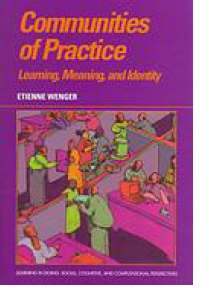Educational theorist and practitioner, Etienne Wenger, argues that learning is an intrinsically social process and that one of the primary sites where learning occurs is in communities of practice.

My assumption as to what matters about learning and as to the nature of knowledge, knowing, and knowers can be succinctly summarized as follows. I start with four premises:
- We are social beings … [T]his fact is a central aspect of learning.
- Knowledge is a matter of competence with respect to valued enterprises—such as singing in tune, discovering scientific facts, fixing machines, writing poetry, being convivial, growing up as a boy or girl, and so forth.
- Knowing is a matter of participating in the pursuit of such enterprises, that is, of active engagement in the world.
- Meaning—our ability to experience the world and our engagement with it as meaningful—is ultimately what learning is to produce …
[T]he primary focus of this theory is on learning as a social participation. Participation … refers not just to local events of engagement in certain activities with certain people, but to a more encompassing process of being active participants in the practices of social communities and constructing identities in relation to these communities …
We all belong to communities of practice. At home, at work. At school, in our hobbies—we belong to several communities of practice at any given time. And the communities of practice to which we belong change over the course of our lives … [C]ommunities of practice are everywhere.
Families struggle to establish an habitable way of life. They develop theory own practices, routines, rituals, artifacts, symbols, conventions, stories, and histories. Family members hate each other … love each other … agree and … disagree. They do what it takes to keep going. Surviving together is an important enterprise, whether surviving consists in the search of food … shelter, or in the quest for a viable identity.
Workers organize their lives with their immediate colleagues and customers to get their job done … they develop or preserve a sense of themselves they can live with, have some fun, and fulfil the requirements of their employers and clients. No matter what their official job description may be, they create a practice to do what needs to be done. Although workers may be contractually employed by a large institution, in day-to-day practice they work with—and in a sense, for a much smaller set of people and communities.
Students go to school and, as they come together to deal in their own fashion with the agenda of the imposing institution and the unsettling mysteries of youth, communities of practice sprout everywhere—in the classroom … playground, officially or in the cracks. And in spite of curriculum, discipline, and exhortation, the learning that is most personally transformative turns out to be the learning that involves membership in these communities of practice … Across a world wide web … people congregate in virtual spaces and develop shared ways of pursuing their common interests …
Communities of practice are an integral part of our daily lives. They are so informal and so pervasive that they rarely come into explicit focus, but for the same reasons they are also quite familiar … [W]e can all construct a fairly good picture of the communities we belong to now, those we belonged to in the past, and those we would like to belong to in the future. We also have a fairly good idea of who belongs to our communities of practice and why, even though membership is rarely made explicit on a roster or a checklist of qualifying criteria … we can probably distinguish a few communities of practice in which we are core members from a larger number of communities in which we have a more peripheral kind of membership …
[C]ommunities of practice can be thought of as shared histories of learning … Practice is a shared history of learning that requires some catching up for joining. It is not an object to be handed down from one generation to the next. Practice is an ongoing, social, interactional process, and the introduction of newcomers is merely a version of what practice already is. That members interact, do things together, negotiate new meanings, and learn from each other is already inherent in practice—that is how practices evolve … Communities of practice reproduce their membership in the same way that they come about in the first place. They share their competence with new generations through a version of the same process by which they develop. Special measures may be taken to open up the practice to newcomers, but the process of learning is not essentially different …
Communities of practice should not be reduced to purely instrumental purposes. They are about knowing, but also about being together, living meaningfully, developing a satisfying identity, and altogether being human. [It] is by its very practice—not by other criteria—that a community establishes what is to be a competent participant, an outsider, or somewhere in between. In this regard, a community of practice acts a logically negotiated regime of competence. Within such a regime, knowing is no longer undefined. It would be defined as what would be recognized as competent participation in the practice … A community’s regime of competence is not static. Even knowing something entirely new, and therefore even discovering, can be acts of competent participation in a practice.
Wenger, Etienne. 1998. Communities of Practice: Learning, Meaning and Identity. Cambridge: Cambridge University Press. pp. 4, 6, 86, 102, 134, 136–7. || Amazon || WorldCat
